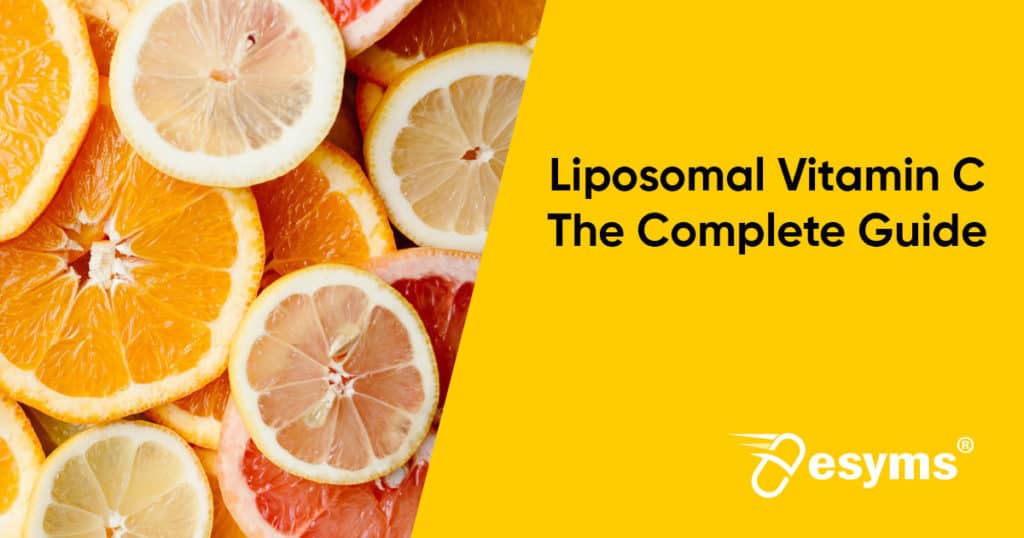The Complete Guide To Liposomal Vitamin C (Updated 2022)

- Esyms Team
- January 19, 2021
- 5:05 pm
- No Comments
SHARE THIS ARTICLE
BROWSE OUR REVIEW
About Liposomal Vitamin C
Vitamin C, or Ascorbic acid is one of the many vitamins needed daily for optimal health. We can obtain it from food such as fruits or vegetables, or supplements as humans are unable to produce Vitamin C themselves in the body.
According to Dietary Reference Intakes (DRI) developed by the Food and Nutrition Board, the recommended vitamin C intake for normal adult men and women are 90mg and 75mg respectively.[1]
The absorption rate of regular vitamin C is lower because water-soluble vitamin C can only be found in water-based compartments in our body such as blood and cannot diffuse into fatty tissues.
This is where liposomal vitamin C comes in handy by improving the overall absorption rate of Vitamin C.
What are the benefits of Vitamin C?
Vitamin C comes with a host of benefits as it is necessary for the growth, development and repair of body tissues.
It is also known for its immunity boosting effects. Regular Vitamin C intake can help against illnesses such as the common cold.
In addition, Vitamin C is an antioxidant that can help to prevent or delay the development of diseases (such as cancer) by limiting the effects of free radicals through its antioxidant properties.
Besides aiding the absorption of iron in the body, studies also show that it is beneficial in heart health, reducing cardiovascular risk. [2]
What are the limitations of regular Vitamin C?
It is shown that consuming high doses of Vitamin C ends up with a threshold concentration instead of a higher concentration of Vitamin C absorbed in plasma.[3]
In other words, the excess vitamin C that cannot be absorbed by our body will be eliminated in urine or feces.
Taking an excessively high dose of regular Vitamin C will cause diarrhea and other digestive problems, even though vitamin C is not toxic.
What is Liposomal Vitamin C?
Liposomes are micro-sized spheres that consist of a double layer phospholipid (fat) membrane outer wall with water-soluble components inside. Liposomes are smaller than cells in our body so it can diffuse into cells easily and deliver enclosed nutrients such as Vitamin C into our body cells without any energy consumption.
In addition, liposomes will protect the inner contents from digestion or oxidation before absorption into the body. As a result, it optimizes the delivery of Vitamin C into the body and can be even better than intravenous delivery.
How does Liposomal Vitamin C work?
Liposomes will fuse with enterocytes, cells that are responsible for absorbing nutrients and making up the gut lining. Liposomal Vitamin C bypasses the normal mechanism of absorbing vitamin C through slow vitamin C receptors type 1 (sodium-dependent vitamin C receptors SCVT 1) and achieves much higher bioavailability compared to standard vitamin C supplements. This delivery system provides a more targeted method to deliver nutrients into the bloodstream without being destroyed by the digestive enzymes and acid found in the digestive tract and stomach.
What are Liposomal Vitamin C benefits?
Liposomal Vitamin C has several advantages compared to regular Vitamin C tablets. Firstly, liposomal Vitamin C will protect Vitamin C from degradation from gastric juices, enzymes, change of pH, and oxidation within the gastrointestinal tract.
Besides that, Vitamin C can achieve better absorption into our systems because the liposomal formulation can diffuse easily through the intestines into our body.
Thus, the distribution and concentration of Vitamin C throughout the body and into the bloodstream will be higher. Lastly, liposomal Vitamin C has a longer duration of action due to the longer presence of phospholipid bilayer, thus allowing the release of vitamin C over a longer period.
What Is Liposomal Glutathione?
Liposomal glutathione is formed when the inner content of liposomes is glutathione. Glutathione is used to maintain the body’s immune system as well as treat metal and drug poisoning. It is shown that liposomal glutathione has positive effects on improvement in immune function and reduces oxidative stress. [4]
Does Liposomal Vitamin C have side effects?
In general, the effect of diarrhea and other digestive problems caused by excessive consumption of regular Vitamin C can be avoided by consuming liposomal vitamin C.
What is the Liposomal Vitamin C dosage?
Similar to conventional Vitamin C, for children above 12 years of age and adults, it is recommended to take 1000mg a day.
Speak To Our Pharmacists
Want to learn more about the best vitamin C products in Malaysia? Click the button below to speak to our Esyms pharmacists
References
- Institute of Medicine. Food and Nutrition Board. Dietary Reference Intakes for Vitamin C, Vitamin E, Selenium, and Carotenoids. Washington, DC: National Academy Press, 2000.
- Knekt P, Ritz J, Pereira MA, O’Reilly EJ, Augustsson K, Fraser GE, Goldbourt U, Heitmann BL, Hallmans G, Liu S, Pietinen P, Spiegelman D, Stevens J, Virtamo J, Willett WC, Rimm EB, Ascherio A. Antioxidant vitamins and coronary heart disease risk: a pooled analysis of 9 cohorts. Am J Clin Nutr. 2004 Dec;80(6):1508-20. doi: 10.1093/ajcn/80.6.1508. PMID: 15585762
- Padayatty S. Vitamin C Pharmacokinetics: Implications for Oral and Intravenous Use. Annals of Internal Medicine. 2004;140(7):533.
- Raghu S, Indu S, Ana C, Neil T, Haley, JS, Todd DS, John PR. Oral Supplementation with Liposomal Glutathione Elevates Body Stores of Glutathione and Markers of Immune Function. Eur J Clin Nutr. https://www.ncbi.nlm.nih.gov/pmc/articles/PMC6389332/
